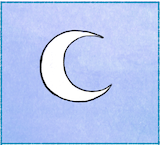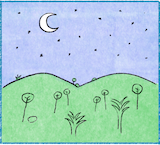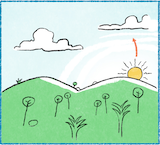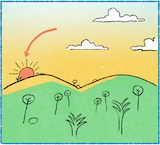




นี้คืออี่หยัง อันนี้คืออี่เกิ้ง อันนี้เป็นอี่เกิ้ง เป็นอี่เกิ้งเคิ่งเสี้ยว หลือว่าดวงจันเคิ่งเสี้ยวนั้นเอง
บางเที่ย ดวงจันกะสิเต็มดวง กะสิเอิ้นอี่เกิ้งเต็มดวง
บางเที่ย อี่เกิ้งมันสิมีเคิ่งเดียว กะสิเอิ้นว่า อี่เกิ้งเคิ่งเสี้ยวนั้นเอง หลือว่าดวงจันเคิ่งเสี้ยวนั้นหละ
อี่เกิ้งนี้มันสิมีญามมื้อคืน เฮาสิสามาดเห็นอี่เกิ้งในญามมื้อคืน
ขั้นญามมื้อเว็นเฮาสิบ่สามาดเห็นอี่เกิ้ง เพาะว่ามันสิขึ้นอยู่เทิงท้องฟ้าแต่ญามมื้อคืน ขั้นญามมื้อแก้งแล้ว มันกะสิตกดิน
5
นี้คืออี่หยัง อันนี้กะอี่เกิ้ง อี่เกิ้งเคิ่งเสี้ยว อยู่เทิงท้องฟ้า
ตอนนี้มันกำลังอยู่เทิงท้องฟ้าอยู่ ตอนนี้กะอาดสิเป็นญามมื้อคืน กะเลยเห็นอี่เกิ้ง แล้วเห็นอี่เกิ้งอยู่เทิงท้องฟ้า
อยู่ข้างๆ อี่เกิ้งมีอี่หยังบ่ กะมีอยู่ มีดวงดาว หลือว่าดาวนั้นหละ
แล้วดาวอยู่เทิงท้องฟ้ามีหลายบ่ กะหลายอยู่ หลายเติบคัก หลายคักอี่หลี เฮาบ่สามาดนับได้ว่ามันมีหลายปานใด แต่ว่าเฮาสามาดแนมเห็นได้ว่ามันมีหลายคัก หลายคักอี่หลี
6
นี้คืออี่หยัง อันนี้คือตะเว็น เป็นดวงตะเว็น หลือว่าพะอาทิด
เฮาสิสามาดเห็นพะอาทิดญามมื้อเว็น หลือว่าญามแก้งแล้วนั้นหละ ญามมื้อคืนเฮาสิบ่สามาดเห็นพะอาทิด เพาะว่าเฮาสิสามาดเห็นมันแต่ญามมื้อเว็นนั้นเอง หลือว่าญามแก้ง
พะอาทิดหลือว่าตะเว็นมันมีปะโยดจั่งใด มันกะมีปะโยดหลายอย่าง มันสิให้แสงสะหว่างญามมื้อเว็น ขั้นญามมื้อเว็นบ่มีพะอาทิด หลือว่าบ่มีตะเว็น โลกของเฮากะสิบ่มีแสงสะหว่าง กะสิมืด กะสิบ่แก้งคือซู่มื้อนี้
7
นี้คืออี่หยัง อันนี้กะตะเว็นคือกัน
ตะเว็นมันกำลังสิขึ้นเทิงท้องฟ้า กะเลยว่ามันกำลังสิแก้งแล้ว
เวลาหลือว่าญามนี้มันกำลังสิเซ้าแล้ว มันเซ้าแล้วนั้นหละ พะอาทิดมันกำลังสิขึ้นเทิงท้องฟ้า ตอนนั้นมันกะตกดินอยู่ มันกะสิขึ้นไปเทิงท้องฟ้า เพื่อที่สิให้แสงสะหว่างญามมื้อเซ้า
มันกะสิค่อยๆ ลอยโอ่งโล่งๆ ขึ้นไปเทิงท้องฟ้า ทีละหน่อยๆ หลือว่าตามเวลาของมัน ตามเวลาของมันที่มันสิขึ้นไป
8
นี้คืออี่หยัง อันนี้กะตะเว็นคือกัน อันนี้กะเป็นตะเว็น
ตะเว็นมันกำลังสิตกดิน ตะเว็นมันกำลังสิตกดินนั้นหละ
เป็นหญังตะเว็นมันคือสิตกดิน มันกะอาดสิค่ำแล้ว สิมืดแล้ว มันฮอดเวลาที่ตะเว็นมันสิตกดิน หลือว่าลงดินแล้ว มันกะต้องตกดินลงไป เพื่อที่ว่าญามมื้อคืนอี่เกิ้งหลือว่าอี่เกิ้งเคิ่งเสี้ยวนั้นกะสิได้ขึ้นมา หลือว่าอี่เกิ้งเต็มดวงกะสิได้ขึ้นมาแทนพะอาทิดดวงนี้ หลือว่าแทนตะเว็นดวงนี้เนาะ
Link to overview page
Link to dictionary
| Isaan | Pronunciation | Tones | Thai | English/Notes |
|---|---|---|---|---|
| นี้ | ni: | HF | นี้ | 1. this 2. here |
| คือ | khʉ: | HR | คือ | 1. to be, to resemble, like, as 2. why {บักหล้าคือบ่เก็บโต่ะแน่ = [addressing a young boy] Why haven't you cleared the table?} |
| อี่หยัง | i:-yaŋ | H-M | อะไร | 1. what {นี้คืออี่หยัง = What is this?} {มื้อนี้เจ้าเฮ็ดอี่หยัง = What are you doing today?} {กินเข้างายกับอี่หยัง = What did you have for breakfast?} 2. something, anything, (in negations) nothing {บ่ต้องเฮ็ดอี่หยังอีกเลยนอกจากใส่ปุย = [we] don't need to do anything besides adding fertilizer} |
| อัน | an | M | อัน | 1. thing, object 2. general clf. for objects |
| อี่เกิ้ง | i:-gə:ŋ | H-HF | พระจันทร์, ดวงจันทร์ | moon {อี่เกิ้งเต็มดวง = full moon} {อี่เกิ้งเคิ่งเสี้ยว = half moon} |
| เป็น | pen | M | เป็น | 1. to be, to exist 2. to be able to 3. to suffer, sth. happens to 4. เป็นหญัง[...]คือ in initial position: why? {เป็นหญังเขากะคือแปงฟัน = Why is he brushing his teeth?} {เป็นหญังเคี่ยงบินมันคือสิตก = Why is the airplane falling down?} |
| เคิ่ง | khəŋ | H | ครึ่ง | half {เวลาห้าโมงเคิ่ง = half past five} {เขาบีบบักนาวเคิ่งน่วย = he's pressing half a lime fruit} |
| เสี้ยว | si:ao | LF | เสี้ยว | part, segment, fraction {อี่เกิ้งเคิ่งเสี้ยว = half moon} |
| หลือ | lʉ: | M | หรือ | or |
| ว่า | wa: | H | ว่า | 1. that, as {คำว่า X = the word X} 2. to say |
| ดวงจัน | du:aŋ-jan | M-M | ดวงจันทร์ | moon |
| นั้นเอง | nan-e:ŋ | HF-M | นั่นเอง | 1. there 2. sure enough 3. emphasizes that the preceding is the topic or has been mentioned before Notes: Thai loan |
| บาง | ba:ŋ | M | บาง | 1. some {สัดบางโตบ่มีขา = some animals don't have legs} {บางคนสิมักกินกวยเตียวแทนเข้า = some people like to eat noodle soup instead of rice (dishes)} {บางสิ่งบางอย่าง = something, anything} 2. thin |
| เที่ย | thi:a | H | ครั้ง, เที่ยว | clf. for times, rounds {บางเที่ย = sometimes} |
| กะ | ga | M | ก็ | 1. then, consequently 2. also |
| สิ | si | M | จะ | future tense auxiliary {เขากำลังสิตื่น = he's about to wake up} {สิไปตะหลาด = [I'm] going to the market} |
| เต็ม | tem | M | เต็ม | full |
| ดวง | du:aŋ | M | ดวง | clf. for hearts, suns, moons, stars |
| เอิ้น | ə:n | HF | พูด, เรียก | to call, to say {เอิ้นง่ายๆ ว่า = in other words} {คนอี่สานเอิ้นว่า เป็นลูกคนกก = Isaan people call her ลูกคนกก} |
| มัน | man | HR | มัน | it (also used to refer to people) |
| มี | mi: | HR | มี | 1. to have 2. there is |
| เดียว | di:ao | M | เดียว | only, alone, single |
| นั้นหละ | nan-la | HF-M | นั่นแหละ | auxiliary for emphasis at the end of a phrase |
| ญาม | ɲa:m | HR | ยาม | 1. period of time {ญามมื้อเซ้า = morning} {ญามเที่ยง = noon} 2. when, while {ญามทอด ต้องใซ้น้ำมันพ้อม = one needs to use oil when frying} {ญามสิออกไปข้างนอกกะต้องใส่เกิบ = when one goes out, ones has to wear shoes} |
| มื้อคืน | mʉ:-khʉ:n | HF-HR | คืน | night |
| เฮา | hao | HR | เรา | 1. personal pronoun: we 2. personal pronoun: I |
| สามาด | sa:-ma:t | M-HF | สามารถ | can, to be able |
| เห็น | hen | M | เห็น | to see |
| ใน | nai | HR | ใน | in, within |
| ขั้น | khan | LF | เมื่อ | when, if |
| มื้อเว็น | mʉ:-wen | HF-HR | กลางวัน | day, daytime |
| บ่ | bɔ: | H | ไม่ | 1. no, not 2. question particle, transforming a statement into a question Notes: spelling exception in line with common usage on social media |
| เพาะว่า | phɔ-wa: | H-H | เพราะว่า | because |
| ขึ้น | khʉn | LF | ขึ้น | 1. to go up, to increase 2. sun: to rise {ตะเว็นกำลังขึ้น = the sun is rising} 3. more 4. bus/train etc.: to get on, to board {พุโดยสานขึ้นลดไฟเบิดแล้ว = all passengers have boarded the train} |
| อยู่ | yu: | H | อยู่ | 1. to be (located) at 2. yet, still 3. auxiliary indicating continuous or progressive action {ทอดปาอยู่ในกะทะ = (in the process of) frying a fish in the pan} {แม่กำลังเมี้ยนเฮียนอยู่ = mother is cleaning/tidying up the house} |
| เทิง | thə:ŋ | HR | บน | 1. on, on top of, at, in {เทิงโต่ะ = at/on the table} {กบมันนั่งอยู่เทิงใบบัว = the frog is sitting on the lotus leaf} {เทิงท้องฟ้า = in the sky} {มันแล่นอยู่เทิงลาง = [the train] runs on rails} {มีคนนั่งอยู่เทิงลดสามล้อสามคน = there are three people sitting in the tuk tuk} 2. up, upward Notes: pronunciation: also realized as ทัง |
| ท้องฟ้า | thɔ:ŋ-fa: | HF-HF | ท้องฟ้า | sky |
| แต่ | tɛ: | H | แต่ | 1. but {แต่บ่ต่างกันหลาย = but not very different} {แต่บ่ลู้ว่าเขาญ่างมาแต่ใส = but [I] don't know where he's coming from, see also: แต่ว่า} 2. only {ตอนนี้มีแต่ขี้ฝ้า = now there are only clouds} |
| มื้อแก้ง | mʉ:-gɛ:ŋ | HF-HF | กลางวัน | daytime |
| แล้ว | lɛ:o | HF | แล้ว | 1. finished 2. already 3. and then, and next (especially แล้วกะ) 4. auxiliary for past tense |
| ตกดิน | tok-din | M-M | ตกดิน | sun: to set |
| ตอนนี้ | tɔ:n-ni: | M-HF | ตอนนี้ | now |
| กำลัง | gam-laŋ | M-HR | กำลัง | auxiliary indicating continuous or progressive action |
| อาด | a:t | LF | อาจ | 1. might, may, will 2. likely |
| เลย | lə:i | HR | เลย | 1. futher on, beyond, past {เข็มน้อยเลยเลขสิบสองไป = the minute hand has passed number twelve} 2. too much 3. at all 4. definitively 5. completely, utterly |
| ข้าง | kha:ŋ | LF | ข้าง | 1. side {มีหูจับสองข้าง = there are handles on both sides} 2. next to {วางอยู่ข้างๆ ก่องใบใหญ่ = it's placed next to the large box} {เขายืนอยู่ข้างๆ อีกพุหนึ่ง = he's standing next to another person} 3. clf. for body parts which come in pairs (eyes, ears, legs etc.) {เขามีตาสองข้าง = she has two eyes} |
| ดวงดาว | du:aŋ-da:o | M-M | ดวงดาว | star |
| ดาว | da:o | M | ดาว | star, planet |
| หลาย | la:i | M | เยอะ, มาก | many, much, very |
| หลายเติบ | la:i-tə:p | M-LF | many, much, very (more intense than หลาย) | |
| คัก | khak | H | intensifier: very, very much | |
| อี่หลี | i:-li: | H-M | จริง | intensifier: really Notes: pronunciation: also realized as อี่หลิ |
| นับ | nap | H | นับ | to count, to count as |
| ได้ | dai | HF | ได้ | 1. can 2. to get, to obtain 3. before verb: indicating past tense 4. บ่ได้ + verb: not |
| ปานใด | pa:n-dai | M-M | เท่าไหร่, มาก | 1. after negative: (not) very, (not) so much {บ่ใหญ่ปานใด = not so large, not very large} 2. how much, how many {เฮาบ่สามาดนับได้ว่ามันมีหลายปานใด = it's impossible to count how many there are} |
| แต่ว่า | tɛ:-wa: | H-H | แต่ว่า | 1. but 2. only {ฮู้แต่ว่าเขายืนอยู่พุเดียว = I only know that he's standing there by himself} |
| แนม | nɛ:m | HR | มอง | to look, to glance, to stare {เขากำลังยืนแนมก้อนหินอยู่ = he's standing and looking at the stone/rock} {ข้างหนึ่งแนมเห็น อีกข้างหนึ่งแนมบ่เห็น = [we] see one side, [we] can't/don't see the other side} |
| ตะเว็น | ta-wen | M-HR | ดวงอาทิตย์ | sun |
| ดวงตะเว็น | du:aŋ-ta-wen | M-M-HR | ดวงอาทิตย์ | sun |
| พะอาทิด | pha-a:-thit | H-M-H | พระอาทิตย์ | sun |
| แก้ง | gɛ:ŋ | HF | สว่าง | bright, light, daylight |
| ปะโยด | pa-yo:t | M-LF | ประโยชน์ | 1. benefit 2. useful |
| จั่งใด | jaŋ-dai | H-M | ยังไง, แบบไหน | how, in what manner {บักนาวมันมีลดซาดจั่งใด = Lime fruits have what kind of taste?} {เขาปิดแอจั่งใด = How is he switching off the A/C?} {เทียนใซ้จั่งใด = How's a candle used?} {สิใซ้จั่งใด = how is [it] used?} |
| อย่าง | ya:ŋ | H | อย่าง | type, kind, sort, category |
| ให้ | hai | LF | ให้ | 1. to give {หมอกำลังเอายาให้คนป่วยกิน = the doctor is giving the patient medicine} 2. for 3. to allow, to be allowed |
| แสง | sɛ:ŋ | M | แสง | light |
| สะหว่าง | sa-wa:ŋ | M-H | สว่าง | bright, shining |
| โลก | lo:k | HF | โลก | world, earth |
| ของ | khɔ:ŋ | M | ของ | of, belonging to |
| มืด | mʉ:t | HF | มืด | dark |
| ซู่มื้อนี้ | su:-mʉ:-ni: | H-HF-HF | ทุกวันนี้ | nowadays, at present, now, these days |
| คือกัน | khʉ:-gan | HR-M | เหมือนกัน | 1. also, likewise, similarly {ยินดีที่ได้ฮู้จักคือกันคับ = Nice to meet you too!} 2. in negative sentences: either {บ่ลู้คือกัน = I don't know either} {จักคือกัน = I don't know (either)} |
| เวลา | we:-la: | HR-HR | เวลา | time, period |
| เซ้า | sao | HF | เช้า | morning Notes: see also มื้อเซ้า, เข้าเซ้า |
| ตอน | tɔ:n | M | ตอน | when, period {ตอนสองโมงเซ้า = at 8 o'clock in the morning} {ในตอนกินเข้า = when eating} |
| นั้น | nan | HF | นั้น | that, there |
| ไป | pai | M | ไป | 1. to go 2. auxiliary indicating action extending into the future |
| เพื่อที่ | phʉ:a-thi: | H-H | เพื่อที่ | in order to, so that Notes: the vowel เอือ is likely to be a Thai loan |
| มื้อเซ้า | mʉ:-sao | HF-HF | เช้า | morning |
| ค่อย | khɔ:i | H | ค่อย | 1. soft, gentle 2. little by little, gradually |
| ลอย | lɔ:i | HR | ลอย | 1. to float, to swim 2. to soar 3. smoke/steam: to rise |
| โอ่งโล่ง | o:ŋ-lo:ŋ | H-H | ลอยอยู่ | floating |
| ทีละ | thi:-la | HR-H | ทีละ | each time, by {กินทีละหน่อยๆ = (of a chicken picking food:) eat a little bit each time} {ขึ้นไปเทิงท้องฟ้าทีละหน่อยๆ = to rise/ascend little by little} |
| หน่อย | nɔ:i | H | หน่อย | a bit, a little bit, not much {as in หน่อยเดียว, หน่อยหนึ่ง} |
| ตาม | ta:m | M | ตาม | 1. according to 2. to follow, to go/come after |
| ที่ | thi: | H | ที่ | 1. that, which {คนที่ยืนอยู่ฝั่งขวา = the person which is standing on the right = the person standing on the right} {เว้าคำที่บ่สุพาบ = to speak words which are impolite = to speak impolitely} 2. for ordinal numbers {ที่สาม = third} |
| หญัง | ɲaŋ | M | อะไร, เป็นหญัง = ทำไม | 1. what {เขากำลังเฮ็ดหญัง = What is he doing?} {ธูปเอาไว้เฮ็ดหญัง = What are incense sticks for?} 2. something, anything, (nothing) 3. เป็นหญัง[...]คือ in initial position: why {เป็นหญังเขาคือใส่บักพิกลงไปในกวยเตียว = Why is he putting chili in [his] noodle soup?} {เป็นหญังหน้าต่างมันคือเปิด = Why is the window open?} {เป็นหญังมันคือมีควนไฟ = Why is there smoke?} |
| ค่ำ | kham | H | ค่ำ | evening, nightfall, dusk, night {เบิดมื้อเบิดค่ำ = [all] day and night} |
| ฮอด | hɔ:t | HF | ถึง | 1. to arrive, to attain {ฮอดจุดหมายปายทาง = (airplane, train etc.) to arrive at one's destination} {มันทันได้ฮอดหกโมงอยู่ = it's not yet 6 o'clock} 2. to, at {ผมญาวฮอดบ่าไหล่เอาโลด = long hair down to the shoulders} 3. about {บ่ได้เว้าฮอด = [I] haven't talked about [this]} {คนที่เฮาเว้าฮอดวั่งหั้นหละ = the person we've just talked about} |
| ลง | loŋ | HR | ลง | 1. to descend, to lower, to go down 2. down 3. bus/train etc.: to get off, to disembark {คนกำลังลงลดบั่ด = people are getting off the bus} 4. boat/ship etc.: to get on, to board {เขากำลังญ่างลงเลีย = he's boarding/getting on the boat} |
| ดิน | din | M | ดิน | earth, soil |
| ต้อง | tɔŋ | HF | ต้อง | to have to, must |
| มา | ma: | HR | มา | 1. to come 2. auxiliary expressing action towards the present or focal time {กะคุเฮ็ดมาจากอี่หยัง = What is the bucket made of?} {แล้วเขากะเก็บเงินจากพุนั้นมา = and then she takes the money of that person} |
| แทน | thɛ:n | HR | แทน | 1. to replace 2. instead of |
| เนาะ | nɔ | H | เนาะ | final particle: makes the statement softer, looking for agreement |